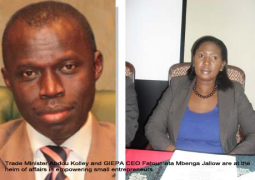
The
European Union, United Nation Capital Develop Fund, Central Bank of The Gambia,
Gambia Bureau of Statistics and FinMark Trust on Tuesday, 26 November 2019
launched The Gambia’s Finscope survey at a local hotel in Kololi.
Data
from the Finscope survey will support evidence based interventions while
designing the country National Financial Inclusion Strategy.
Cognizant
of the impact of Financial Inclusion on Development and in line with its
National Development Plan, The Gambia with the help of UNCDF’s Jobs, Skills and
Finance Programme embarked on the design of a National Financial Inclusion
Strategy (NFIS) with objectives of increasing access and usage of quality,
affordable digital financial services that would enhance poverty alleviation
and spur inclusive growth and development.
The
development of the NFIS is aligned to the main strategic pillars of the
country’s National Development Plan 2018-2021 such as stabilising, stimulating
growth and transforming the economy; making the private sector the engine of
growth transformation and job creation, as well as reaping the demographic
dividend through gender and youth empowerment.
The
Gambia’s NFIS can also be linked with the objectives of the UN Sustainable
Development Goals (SDGs) to address access and usage of financial services
through ending poverty in all its forms. This includes the promotion of social
protection system, decent employment and building the resilience of the poor
among others.
Speaking
at the launching, Dr. Seeku Jaabi, first deputy governor, Central Bank of The
Gambia, said financial inclusion has become a major subject of great interest
for policy makers, regulators, development partners, researchers and market
practitioners.
He
highlighted that given the limited access to finance in The Gambia, there is a
need to develop a comprehensive and inclusive strategy to accelerate the level
of financial inclusion, adding that this strategy requires evidence based
policies to be provided thanks to Finscope survey.
Dr.
Jaabi noted that the Finscope survey will not only help build regulatory and
legal reforms but also take initiatives at broader stakeholders level to make
formal financial services available, accessible and affordable to the majority
of the population in a timely and sustainable manner.
According
to him, in 2017, there were still 1.7 billion adults at the global stage
without an account at a formal financial institution or a mobile money
provider, noting that while this has improved since 2014, when 2 billion people
were classified as “unbanked”, it still represents a huge mountain to climb
with large proportion of these financially excluded found in Sub-Saharan Africa
largely women and youths.
Lunana
Kanashi, European Union rep, said financial access facilitates day-to-day
living, and helps families and businesses plan for everything from long-term
goals to unexpected emergencies.
She
pointed out that research indicates that when countries institute a national
financial inclusion strategy, they increase the pace and impact of reforms,
adding that EU trusts that such a diagnostic will help The Gambia in designing
policies and strategies leading towards increased financial inclusion.
Read Other Articles In Article (Archive)

Mo Ibrahim Foundation to hold high-level Annual Governance Weekend
Oct 27, 2015, 9:45 AM



